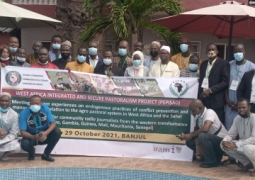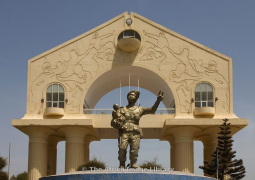
The event, organised by the Office of National Security and supported by ECOWAS, brought together key stakeholders to assess and strengthen the country’s evolving security architecture under its new democratic dispensation.
The SIS representative delivered a well-received address that traced the historical evolution of intelligence in The Gambia, offering insights into how the institution has adapted to meet the demands of democratic governance.
Emphasising the indispensable role of intelligence in safeguarding national security, the presentation underscored how timely, credible, and well-processed intelligence informs strategic decision-making at the highest levels of government. The SIS reaffirmed its commitment to transparency, accountability, and professionalism as pillars of its reform agenda, marking a significant shift from past practices and aligning with broader efforts to build a resilient and democratic security sector.
In a presentation hailed for its clarity and depth, the SIS representative outlined the institution’s transformation journey, highlighting strategic reforms aimed at enhancing transparency, accountability, and public trust. The briefing provided a historical overview of the intelligence service’s evolution, while emphasising its renewed commitment to democratic governance, human rights, and the rule of law.
Human Resource Capacity Building
At the heart of the SIS reform agenda is a robust human resource development strategy. Recognising its workforce as its most valuable asset, the SIS has invested heavily in capacity building aligned with the broader Security Sector Reform (SSR) process. Under the leadership of the Director General, the service has rolled out extensive training programmes in core intelligence tradecraft, academic disciplines, and professional skills.
Notably, the SIS now boasts the highest concentration of graduates, both undergraduate and postgraduate per capita among all security institutions in the country. A cornerstone of this transformation is the establishment of the SIS Academy for Security Studies (SISASS) in 2018, which has trained SIS personnel, other national security actors, and international partners. The Academy also promotes a critical shift in mindset, reinforcing the “Never Again” mantra that underpins The Gambia’s democratic renewal.
Institutional Reforms and Restructuring for Operational Effectiveness
The SIS has undertaken sweeping institutional reforms over the past eight years to improve operational efficiency and responsiveness. Central to this effort is the National Security Belt Initiative (NaSBI), which has enabled strategic redeployment of personnel and resources nationwide. All regional commands have been upgraded to Regional Directorates, fostering closer collaboration with local authorities.
Breaking from its politicised past, the SIS now operates under a merit-based recruitment system with clear entry requirements. The service has successfully repositioned itself as a apolitical institution with a national character, earning widespread respect for its intelligence products. Its commitment to unbiased, high-quality information gathering and analysis has led to a surge in both the volume and value of intelligence outputs.
The SIS has also deepened its engagement with the public, with the Director General holding regular consultations across sectors and hosting press briefings on national security matters. This openness marks a decisive departure from previous practices and reflects the institution’s dedication to integrity, professionalism, and democratic oversight.
The External Front
On the international front, the SIS has gained unprecedented recognition within the global intelligence community. Its partnerships span bilateral and multilateral platforms, including the Committee of Intelligence and Security Services of Africa (CISSA). In 2019, the SIS hosted the first-ever CISSA West Africa regional gathering in The Gambia, followed by several high-level meetings, the latest in November 2022.
The SIS has been unanimously elected Chair of CISSA West Africa for three consecutive years, an exceptional achievement that underscores its growing influence. The service continues to participate in global security forums and has forged strategic alliances with reputable intelligence agencies across every continent.
Reactions to the Presentation
Participants at the workshop expressed unanimous support for the SIS’s reform trajectory, citing improved collaboration and responsiveness. Institutional representatives shared positive experiences, noting the unprecedented support received from the SIS in recent years.
There was a strong consensus on the urgency of passing the draft SIS Bill, which would provide the legal foundation necessary to sustain and expand the service’s reform efforts. Calls were made for the Ministry of Justice and the National Assembly to expedite the legislative process in partnership with the SIS.
The deliberations underscored how far the SIS has come in a relatively short time—not only in rebranding its image but in positioning itself as a central pillar of The Gambia’s national security architecture. Its transformation from a regime-centric entity to a democratic institution is now widely seen as a model for intelligence reform across the region.





